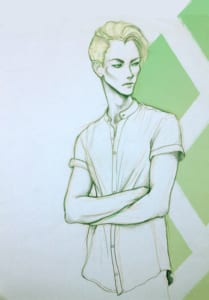Presented by “Harry Potter and the Reread Project”
Quick Note on the Format:
So far, I’ve read all of the Harry Potter books in their entirety before writing a post about them, but due to the sheer length of them and the fact that I’m reading them fairly slowly for a change, that won’t be possible anymore. So starting with this Reread post, this will turn into more of a “chapter by chapter” analysis, except that it will be about larger chunks of the books rather than individual chapters.
Relations between Muggles and Wizards
Harry Potter and the Goblet of Fire starts unlike any of the other books so far, namely with a chapter that isn’t from Harry’s Point of View. Instead, we get introduced to the Riddle House and Frank Bryce, its elderly and embittered caretaker who promptly gets killed by Voldemort for overhearing him and Wormtail plot.
To be honest, I had completely forgotten about said first chapter, despite it being neither boring nor unnecessary, until I actually reread it. I think the main reason for that is that I remember or relate to stories primarily because of their characters and, let’s face it, neither Voldemort nor Wormtail or Frank Bryce are all that enticing as characters.
But what definitely stuck with me while reading this chapter was the way that wizards and witches just completely and utterly did not care how Muggles were affected by contact with the magical world. And I don’t just mean that apparently no one in the Wizarding World noticed what happened to Frank Bryce, I mean that no one noticed that the Riddle family died a very unusual death in the first place.

Wizards not caring about how magic affected Muggles seems like a bit of a theme for the first part of The Goblet of Fire, though, and that becomes especially obvious during the scenes at the Quidditch World Cup. I not only the obvious – the Roberts Family being attacked, levitated and humiliated by Death Eaters – but also the fact that Mr. Roberts continuously had his memory modified just so he wouldn’t guess what’s going on. While we’re clearly meant to be disgusted and horrified by the attack on the Roberts family, I really can’t tell whether we’re meant to be disgusted by wizards messing with someone else’s brain without consent.
I think it’s interesting that this is the first time we get a longer look at wizards getting together outside of Hogwarts and thus a longer look at Wizarding society, and that same first look also includes the first instance of on – page violence against Muggles in the series. It’s also interesting timing, in my opinion: The Prisoner of Azkaban ends with a similarly disillusioning look at Wizarding society which makes it clear to the reader that just because someone isn’t affiliated with Voldemort doesn’t mean they’re good. Goblet of Fire doesn’t only show Muggles being mistreated by Death Eaters, it shows seemingly ordinary wizards joining them and laughing at the Roberts’ fate and ministry officials carelessly performing magic on a Muggle that actually modifies said Muggle’s brain.
However, we also have to acknowledge that it doesn’t entirely make sense for the Roberts family or any Muggles to be at the site of the Quidditch World Cup in the first place. After all, this is something that Muggles shouldn’t know about and that, as we’re conveniently informed by Mr. Weasley, the Ministry of Magic made a lot of effort to conceal it from them, including by picking a deserted moor as the site of the game.
The presence of Mr. Roberts, tap water stations, a small stone cottage and a gate suggest that they simultaneously set up the World Cup site close to a Muggle campground. That seems more than a bit contradictory to me and not all that logical, considering that we’re never given an explanation as to why they didn’t simply magic a campground with all necessary features into existence. It seems like authorial oversight on JKR’s part, to be honest: She needed the Roberts family to be there for plot reasons, so they were there, but she didn’t explain their presence as much as she should have to make it seem logical.
The Weasley Clan
At the same time, I think JKR created a really interesting moral conundrum by showcasing another case of Wizards mistreating a Muggle. I’m, of course, talking about Fred dropping a Ton-Tongue Toffee in front of Dudley while knowing that he would eat it – a scene where I am honestly torn between low key cheering for Fred and thinking that what they’re doing to Dudley is absolutely immoral and genuinely scary.
The thing is, while I completely agree that bewitching Muggles for fun or tricking them into consuming something magical that will change something about them is immoral, I think it’s actually important that Fred gave Dudley the toffee because he’s been bullying and abusing Harry his whole life. Being able to use magic is something that gives Fred and other wizards a genuine advantage over Dudley that they are then using to hurt him, even if it isn’t permanently and can be fixed comparably easily, which means that what they’re doing is, quite simply, bullying.
But at the same time, Dudley has literally done the very same thing to Harry all his life, except that Dudley hasn’t used magic, just his superior strength and the fact that his parents don’t care enough about Harry to stop him. As much as Fred slipping him that toffee was an act of bullying, he himself has done nothing else to Harry. Dudley definitely deserved a taste of his own medicine, but at the same time, Ton-Tongue Toffee seems like a bit too much of said medicine.
What I am genuinely happy about is Arthur Weasley’s outrage about his son’s actions. While it’s clear that he doesn’t really like the Dursleys and thinks them fairly rude, he won’t stand for them being mistreated. His weirdly fetishistic, kind of patronizing obsession with Muggles is annoying and definitely not an ideal relationship with them either, but it is genuinely better than the indifference with which many wizards seem to regard Muggles if they don’t outright think of them as inferior.

Then again, I generally really like the Weasleys and I enjoy reading about them. Especially the introduction of Bill and Charlie is something I have been looking forward to. I’ve always enjoyed reading about them because I think JKR really does a good job of realistically portraying a family with them.
Still, I can’t help but be annoyed by the fact that the rest of the Weasleys being genuinely shitty to Percy is never acknowledged. He is definitely annoying and pompous, but he also gets continuously mocked by his family who also never even pretend to care about his interests.
What JKR really does well with the Weasleys, especially in Goblet of Fire, is the portrayal of poverty, though. It’s not just scenes in which Harry actively thinks about the fact that the Weasleys are far poorer than he is, it’s also tiny details, like Ginny taping her school book back together because it’s so used that it’s falling apart.
Structural Changes
Despite the truly horrific scenes at the end of it, I still really loved rereading the Quidditch World Cup parts of Goblet of Fire. I generally like reading about Quidditch, but I think the World Cup game between Ireland and Bulgaria was one of, if not the best that JKR has written over the course of the entire series. I also really liked the glimpses at wizards from other countries that were given during the World Cup chapters, but in my opinion, they genuinely were far too tiny. I’m also still a bit disappointed that JKR gave us two European countries playing against each other instead of a match between Bulgaria and India, for example, or Ireland and Japan.
The first chapter not told from Harry’s PoV isn’t the only structural change in Goblet of Fire, though: The book is also moving away from the “Something bad is happening and the Trio investigates” – structure of the previous books. In addition to that, JKR’s writing style seems to have changed. The sentences she writes become longer, more complicated and more winding, such as
Frank had not entered it for years; nevertheless, although it was very dark, he remembered where the door into the hall was, and he groped his way towards it, his nostrils full of the smell of decay, ears pricked for any sound of footsteps or voices from overhead.
It’s refreshing, in my opinion, but then again, I’m generally a fan of long, winding sentences.
I also think it was a stroke of genius on JKR’s part to sort of reveal what happened to Bertha Jorkins while not revealing the entirety of it, then making Harry forget all about it again and to then have other characters talk about her disappearance again and again in front of Harry. It’s sort of frustrating to see essentially all the characters be either completely clueless or, even more frustrating, completely careless while knowing as a reader that finding out what happened to her may have stopped Voldemort.
Then again, knowing about Bertha Jorkins in combination with Trelawney’s prophecy from Prisoner of Azkaban and Harry’s dream – vision of Voldemort and Wormtail plotting to kill him creates a sense of foreboding danger and tension that makes it fairly hard to put the book down – even if you already know it.

